Mozambique: First case of mpox diagnosed in Cabo Delgado
Mozambique | Foreign intervention: South Africa says yes, Tanzania no; Covid-19 still low – BY Joseph Hanlon
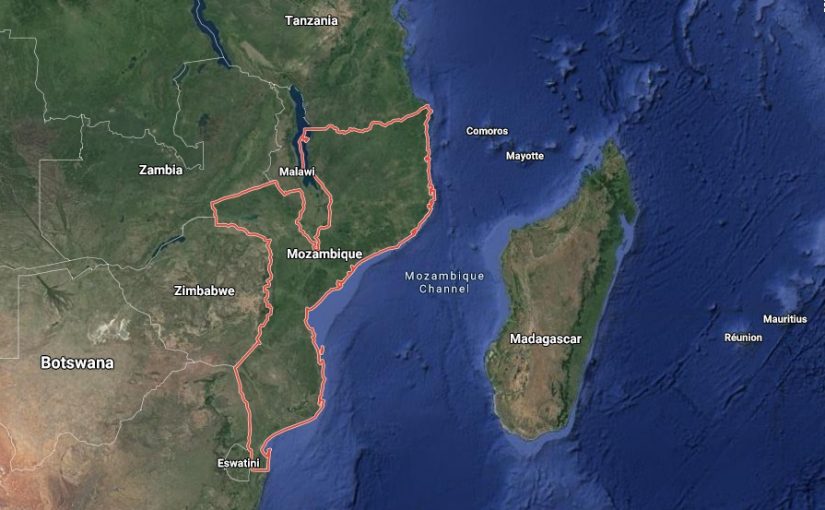
Image. Voa portugues
In this issue
Foreign troops?
- SA says send troops, Tanzania says negotiate
- Rwandan troops for Total security zone?
- Who will be top dog?
- Fighters or job creators?
Covid-19
- 3rd wave inevitable
- Restrictions eased
- New cases at lowest level in months
- South Africa says send troops; Tanzania says no troops, instead negotiate, develop
South Africa is pressing for urgent military intervention in Cabo Delgado, South African Foreign Minister Naledi Pandor told Reuters (21 May) in a telephone interview. Since 2008 SADC has had a regional defence pact that allows military intervention to prevent the spread of conflict. “We support the use of the defence pact. It’s never been really been utilised in the region, but we believe this is the time, this is a threat to the region,” Pandor said.
Tanzania will not send troops to Mozambique to counter insurgents in Cabo Delgado, Minister of Foreign Affairs Liberata Mulamula said Wednesday 26 May in Dar es Salaam. The Tanzania government has, instead, emphasised on the need for talks as a means of promoting peace and tranquility in Mozambique, calling on the international community to help the country by sending development aid. (Citizen 27 May)
A SADC evaluation proposed 3000 troops and equipment including a submarine. The SADC summit scheduled to discuss this was postponed from April to 27 May, and the summit simply postponed the issue until a new summit on 20 June. President Filipe Nyusi’s longstanding opposition to a multi-lateral force and the opposition of some countries such as Tanzania suggest the SADC force will never happen.
At the Frelimo Central Committee on 22-23 May, President Filipe Nyusi made clear he wanted foreign troops. But in his closing speech, he stressed the “concentration on bilateral efforts to combat terrorism in Cabo Delgado”. It is a point he has stressed in private talks with diplomats for more than a year, that he does not want international forces – SADC, EU or UN. Instead he wants agreements with individual governments and the ability to move and assign foreign troops to particular zones or tasks. SADC or UN troops would have their own external commanders, but Frelimo will only accept foreign troops that it controls – which means private military companies (PMCs) or bilateral arrangements with governments.
Will Rwandan troops create the Total security zone?
Rwandan troops may play a central role in creating the security zone around the Palma-Afungi natural gas area. Rwanda has become a major participant in peacekeeping missions and has had troops or police in Central African Republic, Mali, Sudan, South Sudan and other countries. But more three-way discussions will be needed between France, Rwanda, and Mozambique.
On 28 April Mozambican President Filipe Nyusi flew to Rwanda for talks with President Paul Kagame. Just 10 days later a reconnaissance team of Rwandan officers was in Cabo Delgado. Nyusi and Kagame were in Paris for the French Africa summit 17-18 May; both met President Emmanuel Macron and Cabo Delgado was discussed. Last week Marcon was in Rwanda and South Africa to meet their presidents on 27 and 28 May. Again, Cabo Delgado was discussed, although not top of the agenda.
France’s acceptance in a report this year that it bore a responsibility for the 1994 genocide in Rwanda marked a “big step forward” in repairing relations between the two countries, which are now on the mend, Kagame said.
After the fiasco of President Nyusi guaranteeing a security zone including Palma just days before the insurgents took Palma against little resistance, Total wants more than just promises. It will demand overall French control of any security zone, and French navy control of the ocean off of Cabo Delgado. Mozambique will demand that its soldiers are on the ground, but will accept a foreign presence. Rwanda fits the bill. For Mozambique, Rwandan troops are more acceptable than South African soldiers. For France and Total, Rwandan troops are well trained and experienced, and much more effective than Mozambican army or police. Improved relations between France and Rwanda complete the package.
Rwandan opposition journalist Ntamuhanga Cassien was kidnapped on Inhaca on 23 May. He had escaped prison in Rwanda and gained refugee status in Mozambique in 2017, and was running a shop on Inhaca. (BBC, Lusa 28 May, DW 29 May, CDD 30 May) There have been a string of attacks on opponents of Kagame. In 2014 four Rwandans were arrested in Mozambique accused of killing Patrick Karegeya, who had been the Rwandan spy chief and was dismissed by Kagame in 2004, and was living in exile in South Africa. One of those arrested was Francis Gakwerere, who dissidents say heads a Rwandan death squad. The four were apparently released. In 2012, the head of the Rwanda Development Bank, Theogene Turatsinze, was found dead in a river near Maputo. Rwandan businessman Louis Baziga, head of the Rwanda diaspora in Mozambique, was gunned down in Matola in 2019. Rwanda opened its embassy in Maputo in 2019.
- Who will be top dog?
An increasing number of countries want part of the action, and there is a quiet struggle as to who will be top dog. On the ground Portugal has 60 soldiers doing training, the US just finished its first training mission, Rwanda has a military investigation team, and South Africa has had private military companies and sent in soldiers to rescue its civilians after the Palma attack. Off shore, France and South Africa have regular naval patrols and the United States and India have had less frequent patrols.
French President Emmanuel Macron travelled to Africa and met Rwandan President Paul Kagame on Thursday 26 May and South African President Cyril Ramaphosa on Friday, 28 May. In both countries, the Cabo Delgado war was on the agenda. In South Africa Macron said France is available to assist the Mozambican military, but only in the “‘context of a political solution”. And any help “should be an African response at the request of Mozambique and coordinated with the neighbouring countries,” he said. The interest of both Rwanda and South Africa is that France and the EU pay for their intervention.
Macron particularly stressed that France already has a regional presence in its island territories of Mayotte and Reunion, and stood ready to offer naval assistance. “We have frigates and some other vessels in the region and on a regular basis organise operations. So we could be available, and very quickly so, if requested,” he said.
Meanwhile EU foreign policy head Josep Borrell said on 28 May that the EU could have a military training mission in Mozambique in months. “The problem will be to look for capacities. Apart from Portugal, who else is going to contribute?”
Saudi Arabia is working with SADC to support the Mozambican military fight the insurgents, Crown Prince Mohamed Bin Salman said on 20 May. There is a certain irony in this, as many Mozambicans have been trained in Saudi Arabia in fundamentalist Islam.
The United States is now beefing up the embassy’s security advisory team with the help of private military contractors (PMCs). A new adviser to head up the counter-terrorism programme will be provided by one of the Pentagon subcontractors bidding for the contract, reports Africa Intelligence (28 May), a Paris based newsletter which backs Paris in its confrontation with Washington. The US has been strongly critical of the use by Mozambique of PMCs, despite their being extensively used by the US in Afghanistan and elsewhere.
Difficult negotiations are ahead as Mozambique desperately tries to keep support fractured and in pieces it can control, and at least four countries want to be top dog:
United States: Wants a base in southern Africa and has long coveted Nacala, with its big airport and deep water port that would be good for submarines. Mozambique could be its new base for the war against Islamic State. Mozambique could be the new Afghanistan or Libya.
France: Wants control of the gas zone but appears willing to accept Rwandan fighters. But will expect to control coastal security.
South Africa: Wants to assert itself as the regional power but has been cutting the military budget, so hoping the EU will pay.
Portugal: The military of the former colonial power want to return and prove their ex-colony still needs them. They are using their position as president of the EU to gain EU backing for their operation.
None of these four has won a recent war against a guerrilla insurgency. Frelimo won a guerrilla independence war 47 years ago, but has never beaten a guerrilla force.
- Fighters or job creators?
As governments try to militarise Cabo Delgado, civil society groups increasingly stress the need to resolve the roots of the war – growing poverty and inequality, youth seeing no jobs and no future, and the belief that the Frelimo elite are eating all the wealth from rubies, gas, and other resources.
Speaking to Reuters, Foreign Minister Pandor said “We have had our colleagues, for example in Nigeria, saying: ‘don’t allow this to get out of hand because once it does it is uncontrollable and very difficult to reverse’. So, that is why we believe it is urgently necessary that we have action.” Academic analysts point to the similarity to the roots of Boko Haram in Nigeria and al Shabaab in Cabo Delgado. Both are groups in Muslim areas where young people feel marginalised and with no future, and they are recruited on that basis. Thus the “don’t allow this to get out of hand” lesson is the need to create jobs and development before the war gets out of hand. It is, contrary to Pandor, not military but development intervention that is urgent.
Three articles from the South African mainstream establishment point to alternative thinking:
“Suicidal SADC military deployment to Mozambique looms” was the headline of an opinion article in the Johannesburg Business Day (28 May) “SA soldiers will return home in body bags, as was the case in the failed military deployment to the Central African Republic in March 2013. The defence force must serve sovereign national interests and not the interests of private actors working for profit.” The article argues that South Africa government is under pressure from national corporations and France to protect the profits of their investors.
The article continues: “Like France and its transnational corporation Total, the LNG project in Mozambique is critically important for SA and its corporations. SA state financiers the Industrial Development corporation (IDC), the Export Credit Insurance Corporation (ECIC) and the Development Bank of Southern Africa (DBSA) have, in total, lent more than $1bn in public funds to the LNG project. Standard Bank has sunk $485m into the project, and other major players include Absa and Rand Merchant Bank.”
The article is written by Sam Hargreaves, director of WoMin/African Women Activists, and Anabela Lemos of Justica Ambiental/Friends of the Earth Mozambique. The article’s publication in a mainstream business newspaper suggests opposition to militarization of Cabo Delgado is gaining a hearing.
“Regional support is a good start, but much more than a SADC military deployment to Mozambique is needed,” according to a 27 May report from the Institute of Security Studies (ISS) of South Africa. “At the root of the conflict is a governance challenge that includes allegations of deeply entrenched corruption in the ruling party, Frelimo. Poor governance and state absence have antagonised the local population and left a security vacuum. … The government must commit to the development and effective governance of the region.”
Military support may be needed to contain the violence. But the report stresses “the education system must be reinvigorated to train and prepare locals for skills suited to new job opportunities. Authorities in Cabo Delgado would also need to invest in public works programmes to complement job creation in the formal and informal sectors and offer social activities such as sport to engage the youth. An important poverty-alleviation measure would be a cash transfer (or social grants) programme that would directly benefit the community and demonstrate the government’s commitment to development.”
“Maputo needs to own and drive the response to the insurgency and the recovery of local and investor confidence. No amount of private security advice, support or foreign troops and equipment can compensate for political leadership and the establishment of trust between people, the government and regional actors.” Lead author of the report is Jakkie Cilliers, founder and former Executive Director of ISS – another indication that senior establishment figures are pointing to the roots of the conflict.
“Regional military intervention in Mozambique is a bad idea,” wrote Gilbert M. Khadiagala, Professor of International Relations at the University of the Witwatersrand, on 27 May. He argues “SADC interventions in internal conflicts in its neighbourhood haven’t worked out well.” In 1998 Botswana, South Africa and Zimbabwe intervened in Lesotho. “South African troops lost their lives and SADC troops had to withdraw in ignominy. The SADC has since had to continually intervene as a peacemaker in the fractious terrain of Lesotho politics.”
The other major intervention was by Malawi, Tanzania and South Africa to defeat the M23 Movement in the Democratic Republic of Congo (DRC) in 2013. Initially it made a difference. “But the militia menace in the region has continued unabated, raising questions about the long term efficacy of the brigade’s work,” notes Khadiagala.
More generally, military interventions in resource curse civil wars only make matters worse, he says, citing South Sudan, Cabinda in Angola, and the Niger Delta.
“SADC is now being asked to intervene in a conflict [in Mozambique] that it has neither resources nor the political will to manage. When the body bags begin to come home, there will be tremendous pressure on SADC forces to withdraw. Rather than the folly of an intervention, the region should be encouraging the Mozambican state to address the grievances of the communities in Cabo Delgado.” Khadiagala concludes: “SADC’s military intervention will only embolden die-hards in Frelimo who are reluctant to find peaceful and political solutions to the crisis. And the intervention will postpone a problem that is not going to go away any time soon.”
Covid-19
- Third wave of pandemic inevitable
A third wave of the Covid-19 pandemic will inevitably hit Mozambique, and might prove more severe than the second wave, warned the Deputy General Director of the National Health Institute (INS), Eduardo Samo Gudo, on STV (26 May). Since the third wave is already present in neighbouring South Africa, there is little chance that Mozambique will be able to avoid it, and it could hit in two months. The battle now, said Samo Gudo, is to delay the onset of the third wave as much as possible and to flatten the infection curve. This was feasible because the main indicators – such as the number of new cases, hospitalisations, and deaths – show that the Mozambican epidemic is coming under control.
Cases are rising rapidly in South Africa, from 1086 new cases per day on 29 April to 4519 new cases per day on 29 May. South Africa has declared this the start of the third wave and imposed tighter restrictions starting tomorrow (1 June). The curfew will be from 23.00 to 04.00 with restaurants and bars closing a 22.00. Maximum groups indoors are 100 people and outdoors 250 people. There will be stricter enforcement of mask-wearing in public and social distancing.
- But in Maputo, restrictions eased
“The pandemic is far from over” warned president Filipe Nyusi when he announced a slight easing of restrictions on 26 May. The curfew in all cities is shortened to 23.00 to 04.00, and restaurants can stay open until 21.00. Access to beaches for walking and swimming is allowed, but the prohibition on drinking alcohol and gatherings on beaches continues. Bottle stores may open from 09.00 to 17.00 Monday-Saturday but must remain closed on Sundays and holidays. Pre-school education can resume, but subject to strict sanitary conditions.
- Other easing of restrictions include:
+ Large and medium-sized, gymnasiums are allowed to open, not exceeding 40% and 20%of capacity. Small gyms remain closed;
+.State events are now allowed to have up to 150 participants;
+ Religious services, conferences and meetings are now limited to a maximum of 75 people in closed spaces, and should not exceed 40% of the maximum capacity of the venue. In outdoor events, up to 150 people are allowed;
+ Maximum number of 30 people at funerals.
+ Pools may open at 30% of the capacity.
In addition, the validity of specific expired documents is extended until June 30, 2021; issuance of business and work visas resumes.
- New cases and deaths at lowest level in months
Covid-19 cases and deaths have remained steady and relatively low since early April. Deaths from Covid-19 have been 5 per week for the past three weeks. This is the same level as early December, and compared to a peak of 83 in the second week of February. New cases last week were 156, the lowest since early July last year.
Throughout May the number of active cases was the lowest since July last year.
Weekly data and the only good graphs are compiled by Miguel de Brito based on the daily reports by the National Institute of Health. https://www.facebook.com/miguel.de.brito1 and https://covid19.ins.gov.mz/documentos-em-pdf/boletins-diarios/
- Only 2% of adults vaccinated
Only 323,097 people have been vaccinated against the Covid-19 according to Health Minister Armindo Tiago. (STV 24 May). This is just 2% of the 16 million adults in Mozambique.
To date, Mozambique has received 200,000 doses of the vaccine produced by the Chinese Sinopharm company, donated by the Chinese government, and 484,000 doses of the Covishield vaccine. 100,000 doses were donated by the Indian government and 384,000 doses were provided through the Covax facility.
Vaccination priority was health workers, and 57,305 have been vaccinated. By March, six health workers had died of Covid-19 and 1305 tested positive. Covid-19 had infected 8000 civil servants and killed 80. Mozambique has 340,000 civil servants.
- Mozambique Covid-19 in comparison
The table below give deaths per million population per week in the week to 27 May, for selected countries. (Worldometer data). Nearly all deaths from Covid-19 are in the Maputo-Matola capital metropolitan area, which has about 10% of he country’s population, so this has been added to the list. As many Covid-19 deaths are of people with underlying conditions, outside Maputo many deaths may be attributed to HIV/AIDS or other conditions and not reported, so the capital figure may be more accurate.
Deaths per million population, week to 27 May
0 Ghana
0.2 Mozambique
0.4 Norway
0.8 UK
0.9 Portugal
1 Denmark
2 Sweden
2 Moz capital metropolitan area
5 Japan
5 Netherlands
6 Spain
7 Cuba
10 South Africa
11 USA
13 France
13 Germany
30 Hungary
Other news
The 12th Frelimo congress will be held 23-28 September 2022 in Matola. The Congress elects the new Central Committee (CC) which immediately elects the new Political Commission (PC) which is the ruling body of Frelimo between CC meetings. Sometime in 2023 the CC will select the Frelimo presidential candidate for the 2024 national elections. The battle to be Frelimo candidate has already started and will be in the news for the next two years.
The President of Mozambique is a different post than head of the party. The head of the party is elected by the CC after the national election of the President, probably in March 2025. So far the President has always also been head of Frelimo, although in 2015 after Nyusi had been elected. Guebuza tried unsuccessfully to remain as party head.
“We shall fight vehemently against corruption inside the party, but without any witch-hunts,” Filipe Nyusi, speaking as president of Frelimo, told the CC on 23 May. “Corrupt people and thieves must not be appointed or elected”, he warned. “Don’t let us make efforts to elect criminals”. Comment: The coded message appears to be that some elected members of the PC and CC are too powerful to be challenged for the way they accumulated their wealth, which would be called a “witch-hunt”, but if they are not re-elected next year, they could be investigated. This, in turn, seems a challenge to Frelimo not to elect or re-elect people involved in the secret debt case, as well as Cabo Delgado oligarchs whose greed some see as partly responsible for the current civil war. jh
Cyclones Jobo and Kenneth were unusual, but not unique, however they are a precursor of what is coming, write climate scientists. Jobo hit Cabo Delgado and Tanzania in April this year, Kenneth in 2019 was the strongest cyclone to ever hit Cabo Delgado. Media reported them as unique, but historic records show that Tanzania was hit by damaging cyclones in 1872 and 1952. So, not unique, but very unusual. To form, cyclones requires a sea surface temperature of at least 26.5ºC and a sufficiently strong Coriolis effect. Coriolis is the way the spinning of the earth causes a storm to spin. Because the earth is a spinning ball, the speed of rotation is greatest at the equator and gets smaller with increasing latitude, and the Coriolis effect is greater with lower speed. The cyclone belt is where the temperature is high enough – near the equator – and the Coriolis effect is greatest – away from the equator. In the southern hemisphere, the zone with both is roughly Mozambique north to Nampula province and Madagascar. But the climate scientists warn that “with the warming of sea surface temperatures, especially the rapidly warming Indian Ocean, intense cyclones are expected to become more prevalent. With rising sea levels, storm surges (resulting from the strong winds of cyclones) will cause more wide spread damage. Once-a-century extreme sea-level events, which can result from these storm surges, could strike the East African coastline every year by 2050.”
By Joseph Hanlon



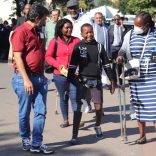
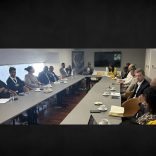
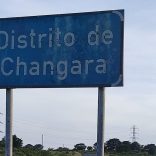
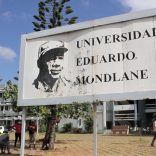
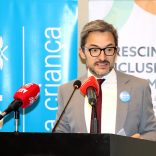





Leave a Reply
Be the First to Comment!
You must be logged in to post a comment.
You must be logged in to post a comment.